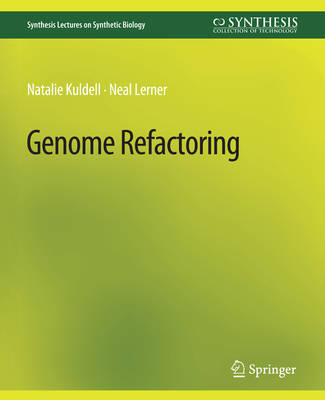
- Retrait gratuit dans votre magasin Club
- 7.000.000 titres dans notre catalogue
- Payer en toute sécurité
- Toujours un magasin près de chez vous
- Retrait gratuit dans votre magasin Club
- 7.000.000 titres dans notre catalogue
- Payer en toute sécurité
- Toujours un magasin près de chez vous
Description
The science of biology celebrates the discovery and understanding of biological systems that already exist in nature. In parallel, the engineering of biology must learn how to make use of our understanding of the natural world to design and build new useful biological systems. ""Synthetic biology"" represents one example of recent work to engineer biological systems. This emerging field aims to replace the ad hoc process of assembling biological systems by primarily developing tools to assemble reliable-but-complex living organisms from standard components that can later be reused in new combination. The focus of this book is ""genome refactoring,"" one of several approaches to manage the complexity of a biological system in which the goal is to redesign the genetic elements that encode a living form--preserving the function of that form but encoding it with a genome far easier to study and extend. This book presents genome refactoring in two ways: as an important aspect of the emerging field of synthetic biology and as a powerful teaching tool to train would be professionals in the subject. Chapters focus on the overarching goals of synthetic biology and their alignment with the motivations and achievements in genome engineering; the engineering frameworks of refactoring, including genome synthesis, standardization of biological parts, and abstraction; a detailed description of the bacteriophages that have been refactored up to this point; and the methods of refactoring and contexts for that work drawn from the bacteriophage M13. Overall, these examples offer readers the potential for synthetic biology and the areas in need of further research. If successful, synthetic biology and genome refactoring could address any number of persistent societal needs, including sustainable energy, affordable and effective medicine, and green manufacturing practices. Table of Contents: Tools for Genome Engineering and Synthetic Biology / Bacteriophage as Templates for Refactoring / Methods/Teaching Protocols for M13 Reengineering / Writing and Speaking as Biological Engineers / Summary and Future Directions / Appendix A / Appendix B / Appendix C
Spécifications
Parties prenantes
- Auteur(s) :
- Editeur:
Contenu
- Nombre de pages :
- 66
- Langue:
- Anglais
- Collection :
Caractéristiques
- EAN:
- 9783031014413
- Date de parution :
- 16-07-09
- Format:
- Livre broché
- Format numérique:
- Trade paperback (VS)
- Dimensions :
- 191 mm x 235 mm
- Poids :
- 171 g







